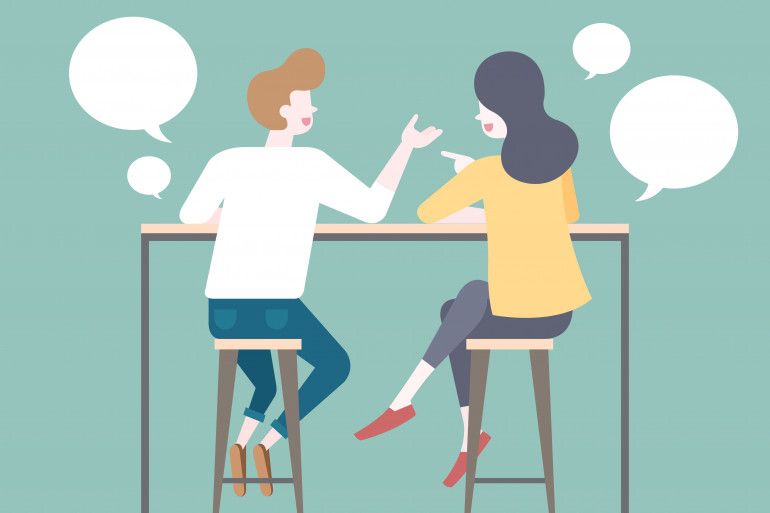Have you been learning Korean and want to talk with natives but don't know how to start a conversation? You are in the right place! By the end of this lesson, you will know 10 basic Korean conversation icebreakers that will help you connect with native Koreans.
10 Basic Korean Conversations
In every language, there are many ways to say something. In English, to find out someone's age you might ask “how old are you?”, “what year were you born?” or “when were you born?”. In Korean, there are also many ways to say something.
The following Korean phrases and dialogues are the most common ways you would ask and answer each of the questions below. Take a look at the table to preview what you will be learning.
| Audio | English | Pronunciation | Speech Level |
|---|---|---|---|
| What is your name? | seonghami eotteoke doeseyo? | Formal | |
| What is your name? | ireumi eotteoke doeseyo? | Polite | |
| How old are you? | yeonsega eotteoke doeseyo? | Formal | |
| How old are you? | myeot sarieyo? | Polite | |
| Do you speak Korean? | hangugeoreul haseyo? | Polite | |
| Do you speak English? | yeongeoreul haseyo? | Polite | |
| Where are you from? | eodieseo wasseoyo? | Polite | |
| Could you say that one more time? | hanbeon deo malhal su isseul kkayo? | Polite | |
| Could you help me? | jom dowajul su itnayo? | Polite | |
| What are your hobbies? | chwimiga mwoyeyo? | Polite | |
| Where do you go to school? | hakgyo eodi daniseyo? | Polite | |
| What is your major? | jeongongi mwoyeyo? | Polite | |
| What do you do for work? | eotteon ireul hasinayo? | Polite |
1) What is your name?
There are two common ways to say this phrase. The first 이름이 뭐예요? (ireumi mwoeyo) is the polite version. The second 성함이 어떻게 되세요? (songhami ottoke dweseyo) is the formal version. The polite version might be used with someone close in age to you or younger. The formal version is usually used with those who are clearly older than you or in a formal situation.
One of the differences between these two phrases is the words 성함 (songham) and 이름 (ireum). These words both mean name, but 성함 (songham) is the polite version. In Korean many words are used exclusively in formal situations, 성함 (songham) is one of them
Now let's take a look at a conversation you might hear play out in Korea.
Dialogue 1:
Person 1: 안녕하세요? 성함이 어떻게 되세요? (annyonghaseyo songhami ottoke dweseyo)
Hello. What is your name?
Person 2: 안녕하세요? 저의 이름은 케이티예요. (annyonghaseyo joe ireumeun keitieyo)
Hello. My name is Katy.
Person 1: 케이티 반갑습니다. (keiti bangapsseumnida)
It's nice to meet you, Katy.
Dialogue 2:
Person 1: 안녕하세요? 이름이 뭐예요? (annyonghaseyo ireumi mwoeyo)
Hello. What's your name?
Person 2: 네, 안녕하세요? 제 이름은 제시예요. (ne annyonghaseyo je ireumeun jesieyo)
Hello. My name is Jessie.
Person 1: 제시 만나서 반갑습니다. (jesi mannaso bangapsseumnida)
It's nice to meet you, Jessie.
2) How old are you?
This question also has two common ways of asking it. 몇 살이에요? (myot sarieyo) is the polite version while 연세가 어떻게 되세요? (yonsega ottoke dweseyo) is the formal version. 살 (sal) and 연세 (yonse) are both words meaning “age” or “year”. 연세 (yonse) is the formal word for age.
Age is viewed differently in Korea than it is in America. While in some situations it is rude to ask one’s age in America, that is not the case in Korea. Age is an important part of Korean culture because it decides the manner in which you interact with someone. So don’t hesitate on account of rudeness. Just ask!
Dialogue 1:
Person 1: 몇 살이에요? (myot sarieyo)
How old are you?
Person 2: 저는 수물 네 살이에요 (joneun sumul ne sarieyo)
I am 24 years old.
Person 1: 우리 동갑이네요! (uri donggabineyo)
We are the same age.
Dialogue 2:
Person 1: 연세가 어떻게 되세요? (yonsega ottoke dweseyo)
How old are you?
Person 2: 저는 스물 한 살입니다. (joneun seumul han sarimnida)
I am 21 years old.
Person 1: 어리시네요! (orisineyo)
You are young!
3) Where are you from?
In Korea, most of the time it will be fairly obvious that you are a foreigner if you aren't Korean, so this might be a question you are asked often. You will hear 어디에서 왔어요? (odieso wassoyo), to which you can reply with the country you are from. Check out the dialogue below to see how the conversation might play out.
Dialogue:
Person 1: 어디에서 왔어요? (odieso wassoyo)
Where are you from?
Person 2: 저는 미국에서 왔어요. (joneun migugeso wassoyo)
I am from America.
4) What are your hobbies?
취미가 뭐예요? (chwimiga mwoeyo) is a good conversation starter that you might ask a new friend after greeting them. 취미 (chwimi) means hobby and 뭐 (mwo) means what. If you hear 뭐 (mwo) you can assume what you are being asked is a question.
Dialogue:
Person 1: 취미가 뭐예요? (chwimiga mwoeyo)
What are your hobbies?
Person 2: 저는 축구 좋아해요. (joneun chukkku joahaeyo)
I like soccer.
Person 1: 저도 축구 좋아해요. (jodo chukkku joahaeyo)
I like soccer too.
5) Where do you go to school?
You might hear 학교 어디 다니세요? (hakkyoreul odi daniseyo) a lot if you are a student. 학교 (hakkuo) means school. You may also hear 대학교 (daehakkkyo) which means college/university.
Dialogue:
Person 1: 학교 어디 다니세요? (hakkkyo odi daniseyo)
Where do you go to school?
Person 2: 저는 서울대 다녀요. (joneun souldae danyoyo)
I go to Seoul University.
Person 3: 저도요! (jodoyo)
Me too!
6) What is your major?
전공이 뭐예요? (jongongi mwoeyo) is another question you will likely be asked as a student. 전공 (jongong) is “major” and as we learned above, 뭐 (mwo) is “what”. It might be a good idea to look up what your major is in Korean so you are ready to answer this question if someone asks. Try using Naver’s English - Korean dictionary for this.
Dialogue:
Person 1: 전공이 뭐예요? (jongongi mwoeyo)
What is your major?
Person 2: 저는 심리학 공부해요. 전공이 뭐예요?(joneun simnihak gongbuhaeyo jongongi mwoeyo)
I study psychology. What is your major?
Person 1: 저는 정치학 공부해요. (joneun jongchihak gongbuhaeyo)
I study political science.
7) What do you do for work?
If you just met the person, sometimes Koreans can be hesitant to tell you where they work as it often gives away things like social or education status. So instead of a question like “where do you work?” “what do you do for work?” is a more comfortable question to ask.
어떤 일을 하세요? (otton ireul haseyo) is how you ask “what do you do for work?” in Korean. It is made up of the words, 어떤 (otton) which means “what kind of” and 일 (il) which means “work”.
Dialogue:
Person 1: 어떤 일을 하세요? (otton ireul haseyo)
What do you do for work?
Person 2: 저는 아이를 가르쳐요. 어떤 일을 하세요? (joneun aireul gareuchoyo otton ireul haseyo)
I teach children. What do you do for work?
Person 1: 저는 컴퓨터 일을 해요. (joneun kompyuto ireul haeyo)
I work with computers.
8) Do you speak English?
These last three questions will be useful when communicating in Korean as a Korean language learner. As a language learner, there will be a lot of things you are unable to say in Korean, and in some situations, like at a bank or a post office, it might be necessary to ask for an English speaker. You can say 영어를 하세요? (yongoreul haseyo) to ask “Do you speak English?”.
영어(yongo) is the Korean word for “English”. You can also ask someone if they know how to speak Korean by switching 영어 (yongo) with 한국어(hangugo). This would become 한국어를 하세요? (hangugoreul haseyo).
Dialogue:
Person 1: 영어를 하세요? (yongoreul haseyo)
Do you speak English?
Person 2: 네, 영어해요. (ne yongohaeyo)
Yes, I do.
Person 1: 한국어를 하세요? (hangugoreul haseyo)
Do you speak Korean?
Person 2: 네, 해요
Yes, I do.
9) Could you say that one more time?
From my experience, 한번 더 말할 수 있을 까요? (hanbon do malhal ssu isseul kkayo) is the most important phrase you can know when learning Korean. There are many times when I didn’t quite understand what someone was saying, but after they repeated it, I was able to. Use this as much as you can! Koreans are usually very patient with those trying to speak their language.
Dialogue:
Person 1: 최송하지만 한번 더 말할 수 있을 까요? (chwesonghajiman hanbon do malhal ssu isseul kkayo)
I’m sorry but could you say that one more time?
10) Could you help me?
좀 도와줄 수 있나요? (jom dowajul ssu innayo) is also an essential phrase to know. You can use this when asking for directions, asking about a word you don't know, and in dozens of other situations.
Dialogue:
Person 1: 좀 도와줄 수 있나요? (jom dowajul ssu innayo)
Could you help me?
Person 2: 네, 어떻게 도와줄 까요? (ne ottoke dowajul kkayo)
Yes, how should I help you?
You have now learned 10 new Korean conversation phrases and several new words that you will hear being used in these phrases. Try to practice them as much as you can!
Practice them by using them in conversation and also reading the above dialogues aloud to become familiar with all the words used. You can also check out the script PDF I created below to see all the conversations in one place.
How Questions are Expressed
An important thing to remember when practicing these conversations is that a question is expressed differently in Korean than in English.
In English, we have question words like if, when, where, what, and how. In Korean, while these words do exist, they do not need to be in a sentence for it to be a question. To take one of the above phrases we learned as an example, 영어를 하세요? (yongoreul haseyo) can either translate to “speak English” or “Do you speak English?”.
The question “Do you speak English?” is conveyed by raising the tone at the end of the sentence. If you don't raise the tone, people might think you are demanding they speak English to you, which could come off as rude. Practice your intonation by listening to the above audio clips and looking at the chart below.
Some Tips for Korean Conversation
After learning the phrases above you are probably ready to engage in your first Korean conversation. Here are some tips for your first conversation.
1) Learn some words in Korean to describe yourself - are you from the US? Do you study chemistry? Do you like to read books on the weekend? If you do then you should learn the words for US, Chemistry, and books in Korean.
Whatever your interests are, you should learn how to say them in Korean. This will prepare you to answer the questions you are asked. And if you can understand and answer questions, then the conversation will flow easier.
2) Practice your pronunciation - Memorizing phrases is only useful if people can understand what you are saying when you repeat them. Practice your pronunciation using the audio clips above. You can also you the website Papago to listen to the Korean of any word or sentence.
K-dramas are also a great way to listen to how Koreans use intonation when speaking. Even if you don't understand what you are saying, copying a k-drama can help with pronunciation and intonation.
3) Ask for help with your Korean - Let whoever you are talking to know that you are learning Korean and that you would appreciate it if they are patient with you and correct any mistakes you make.
This will not only help you improve your Korean, but it will let the person you are talking to know that you are committed to learning and talking with them.
You have now finished the lesson! Thank you for reading to the end and remember to practice! You will be comfortable having basic Korean conversations with natives in no time! 그럼 다시 만날때 까지! (then, Until we meet again!)



